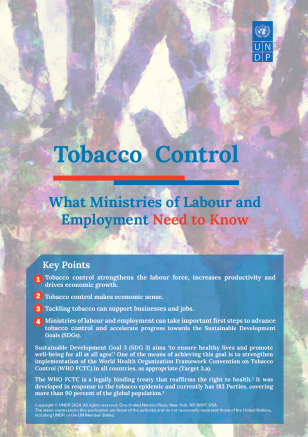Tobacco Control: What Ministries of Labour and Employment Need to Know

Tobacco Control: What Ministries of Labour and Employment Need to Know
February 5, 2024
Tobacco kills 8.7 million people every year, including up to half its users in addition to non-users exposed to deadly second-hand smoke. The burden of tobacco reaches far beyond health, weakening the economy, disrupting social systems and damaging the environment. Low- and middle-income countries (LMICs) bear a greater portion of the global burden, with over 80% of tobacco users living in LMICs.
Without adequate investment in tobacco control it is estimated that up to 1 billion people could die from tobacco-related diseases during this century alone.
Urgent and whole-of government action is needed to tackle the tobacco burden, calling for a response from all government sectors. This brief is part of a set of 13 provided by UNDP that map out roles and first steps different parts of government can take to help achieve the SDGs by reducing tobacco use.
Ministries of labour and employment can take key steps to advance tobacco control and accelerate progress towards the SDGs. This includes ensuring the participation of the ministry in tobacco control multisectoral action plans and coordinating mechanisms, considering the promotion and support of economically viable alternatives for tobacco workers and growers, and promoting policy coherence. Ministries of labour and employment also stand to benefit from tobacco control – tobacco control strengthens the labour force, supports businesses and jobs, increases productivity, and drives economic growth. Across 24 LMICs from phase 1 and 2 of the FCTC 2030 project, investing in stronger tobacco control would avert US$64 billion in economic losses over the next 15 years.

 Locations
Locations